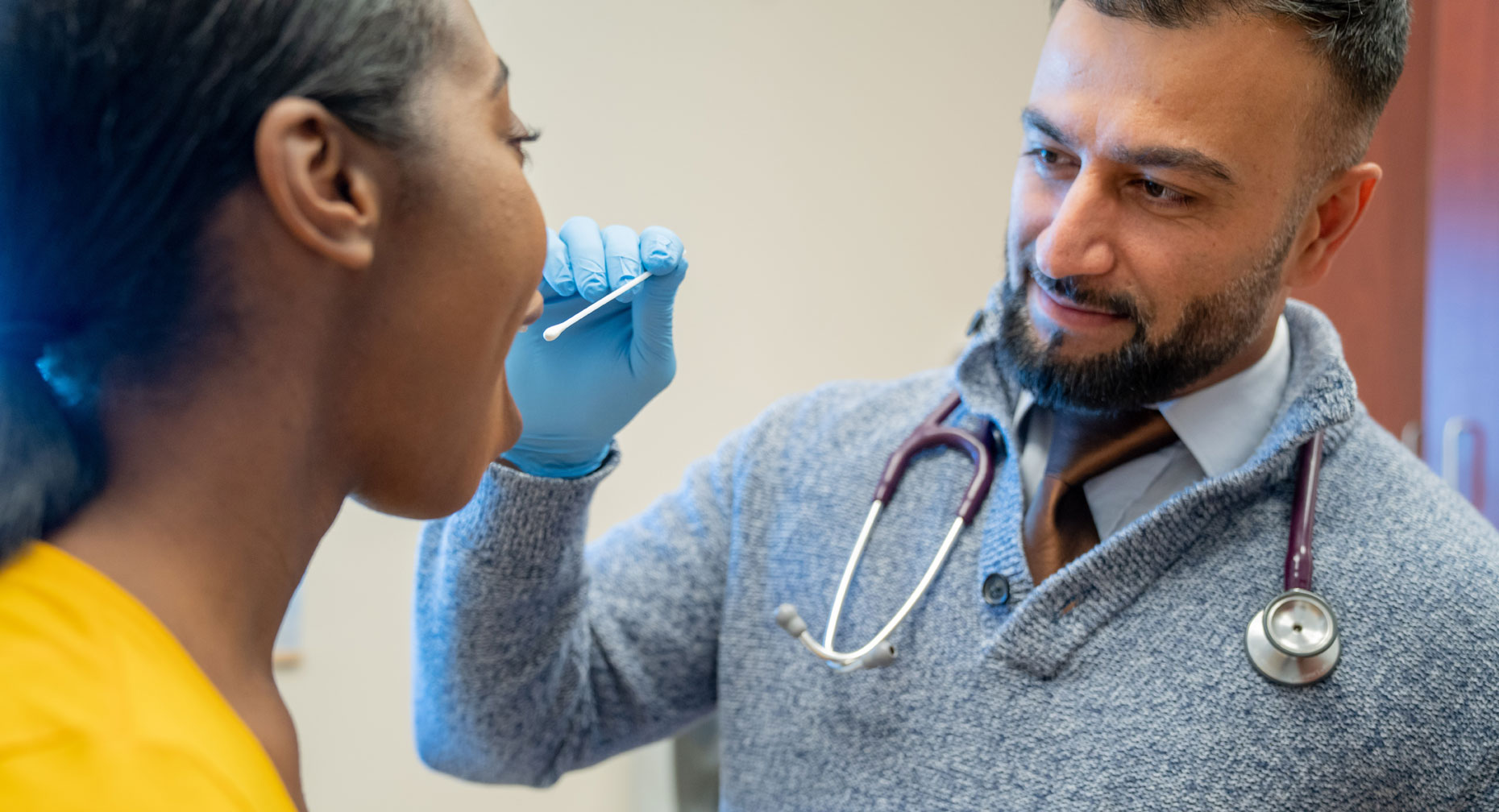Genetic Carrier Testing: 11 Questions if a Baby’s in Your Future

Answer a few questions and we'll provide you with a list of primary care providers that best fit your needs.
Whether it’s grandpa’s regal nose, or auntie’s luxurious dark curls, or dad’s bald spot, when something about our kids reminds us of ourselves or other relatives, we often remark (sometimes as a joke) that “it’s in the genes.”
But our genes can influence more than our looks. For some, mutations in our genes can determine whether or not we inherit a serious disorder, like cystic fibrosis or Tay-Sachs disease.
If you plan to have children or are already pregnant, genetic carrier screening could help determine what your risk of passing along a birth defect or disorder might be. But before you spend hundreds or even thousands of dollars on screening and testing, educate yourself on the details, and the pros and cons of having it done.
“It’s important to understand the testing before it’s done,” says David McKenna, MD, a specialist in maternal and fetal medicine at Perinatal Partners in Dayton. “What is it for, and what are the positive and negative implications? Increased risk should be explained. Also, it’s important to know the difference between screening versus diagnosis.”
“It’s best before any genetic testing that you have the appropriate counseling regarding what you’re being tested for, and understand the significance of a positive result,” Dr. McKenna says.
1. What is Genetic Carrier Screening?
A genetic carrier screening test can tell you whether you are at risk for carrying a mutated gene that can lead to a genetic disorder. If the child’s other parent carries the same mutation, the two of you could produce a child with that disorder. This is known as a recessive gene.
2. What is a Gene?
A gene is a section of DNA that contains instructions for how the body grows and develops. Genes are the basic elements of heredity and are passed from parents to their biological children.
3. Who Should Have a Carrier Screening?
People of certain ethnic heritages are more likely to be carriers for some disorders and should consider screening. This includes people of Ashkenazi Jewish, Mediterranean and/or African-American heritage. Also, if you have a family history of genetic disorders, or show signs of one, you should think about being screened.
Keep in mind that, although certain genetic disorders are significantly more common in people with these ethnic backgrounds, people of any descent can have the disorders.
4. What Kind of Genetic Disorders are Covered by the Screenings?
The screening tests, and reasons for them, vary. But the recessive disorders most commonly screened for include cystic fibrosis, Tay-Sachs disease, sickle cell disease, thalassemia, fragile X syndrome, Canavan disease and familial dysautonomia. Many of these disorders can be extremely serious, Dr. McKenna says.
There are many more, less common, recessive disorders and not all can be detected with screenings.
5. When Should We Have the Screening Done?
Some people choose to be screened before trying to conceive. Others wait until they’re already expecting.
Dr. McKenna recommends seeing a genetic counselor before getting screened, and preferably before conceiving. A genetic counselor will review your health history, explain the details to help you decide whether to have genetic testing done, and help choose the best test for you. Doing this before becoming pregnant gives you more time to learn about your risks, think about your options and plan ahead.
“It’s best before any genetic testing that you have the appropriate counseling regarding what you’re being tested for, and understand the significance of a positive result,” Dr. McKenna says.
6. How is a Carrier Screening Test Performed?

Types of carrier screenings vary, but usually involve testing a sample of blood, saliva, hair, tissue or amniotic fluid (the fluid surrounding the fetus during pregnancy). Often, the sample is taken by swabbing the inside of the cheek.
Usually, the person who is most likely to be a carrier is tested first. If the first person’s test results are negative (meaning that person is not a carrier), then no additional testing is needed. If the results are positive, then the partner will be tested.
Once the sample is taken, it’s sent to a lab, where technicians look for noticeable changes in chromosomes, DNA or proteins, depending on the suspected disorder.
7. Will the Screening Tell Me if My Child Will Inherit a Genetic Disorder?
According to the American College of Obstetrics and Gynecology, if both parents carry a recessive gene for a disorder, there is a 25 percent (1 in 4) chance that their children will have the disorder.
8. But I Feel Fine. Should I Still Be Concerned?
Often, a recessive gene can be passed from one generation to the next without anyone knowing they carry the gene, or experiencing symptoms. But if you conceive a child with someone who also carries the recessive gene, you have a 1 in 4 chance of having a child who actually has the disorder.
A screening test can provide reassurance if the results are negative, and give prospective parents a chance to plan ahead if the results are positive.
Some people, even if they know that they are carriers, are not interested in being screened. It’s a personal choice, says Dr. McKenna, and screening is voluntary.
9. Are the Tests Accurate?
Usually the tests are accurate, but sometimes there are false results (false negatives and false positives). Also, some tests don’t identify every possible genetic disorder, so you could have negative results but still carry a recessive gene that wasn’t identified by the test.
10. Is the Screening Covered by Insurance?
Some insurers cover some tests. Because the screenings can be expensive, check with your insurance plan before moving forward to make sure you won’t have to cover the expenses out of pocket.
11. What if the Tests Show That We are Both Positive? What’s Next?
“If the screening test is positive, your doctor and genetic counselor will spend time with you to discuss your options for pregnancy care and to optimize outcomes for your baby,” explains Dr. McKenna.
Plan Ahead for the Best Results
If you are planning to have children, and/or have concerns that you might be a carrier of a genetic disorder, talk to your family physician or obstetrician/gynecologist as early as possible, preferably before you conceive. Your doctor will discuss your options with you, including whether you need to see a genetic counselor and a maternal-fetal specialist.
“Know your family history,” Dr. McKenna explains. “If you do know that something runs in the family, tell the doctor, especially if it’s a birth defect or other genetic disorder.”
Answer a few questions and we'll provide you with a list of primary care providers that best fit your needs.
Source: American Pregnancy Association; American College of Obstetrics and Gynecology; Johns Hopkins; National Institutes of Health; David McKenna, MD, Perinatal Partners





